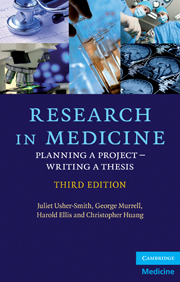Book contents
- Frontmatter
- Contents
- Preface
- 1 Introduction
- 2 Deciding whether to do research
- 3 Deciding when to do research
- 4 Selecting a research degree
- 5 Choosing a department, research supervisor and project
- 6 Applying for research positions and funding
- 7 Getting started
- 8 Overcoming frustration
- 9 Writing scientifically
- 10 Publishing a paper
- 11 Attending scientific meetings
- 12 Writing a thesis
- 13 Submitting a thesis and preparing for the viva voce examination
- Further reading
- Appendix: Information for research students wishing to study overseas
- Index
7 - Getting started
Published online by Cambridge University Press: 05 May 2010
- Frontmatter
- Contents
- Preface
- 1 Introduction
- 2 Deciding whether to do research
- 3 Deciding when to do research
- 4 Selecting a research degree
- 5 Choosing a department, research supervisor and project
- 6 Applying for research positions and funding
- 7 Getting started
- 8 Overcoming frustration
- 9 Writing scientifically
- 10 Publishing a paper
- 11 Attending scientific meetings
- 12 Writing a thesis
- 13 Submitting a thesis and preparing for the viva voce examination
- Further reading
- Appendix: Information for research students wishing to study overseas
- Index
Summary
The first phase: getting started
Congratulations! You have now passed the major initial hurdles of making the decision to pursue research, and of following this decision through to the position where you are able to start. The remarks in this chapter primarily concern your fitting into, and learning to function in, this new environment. How you begin your period of research and the methods you use will obviously vary depending on whether your research is primarily laboratory or patient based. There are, however, many issues common to all types of research.
A doctor in research
When you join a research group, whether in a university or clinical department, you will find yourself in a very different setting, with values distinct from those to which you are accustomed in the clinic or ward. You should try as quickly as possible to assimilate into the local scene. Even if the atmosphere is initially alien to you, this may reflect its tradition of research achievement just as the particular environment in a successful hospital promotes good clinical results. However, this does not mean a clinician does not have anything to offer a research environment. Some of the advantages you will have gained from a clinical background are as follows:
You will often be more realistic as to what to expect of others.
You will often have more social confidence and take more care in your dealings with others.
You will have a better sense of what can or cannot be achieved in limited time.
[…]
- Type
- Chapter
- Information
- Research in MedicinePlanning a Project – Writing a Thesis, pp. 51 - 70Publisher: Cambridge University PressPrint publication year: 2010



